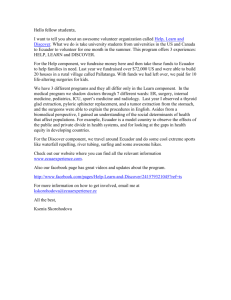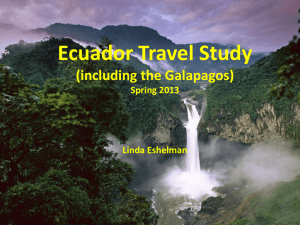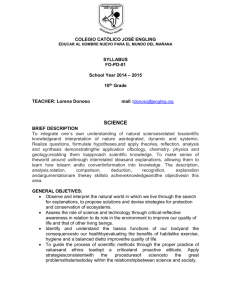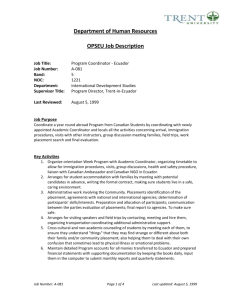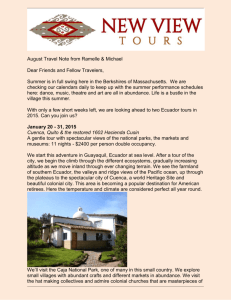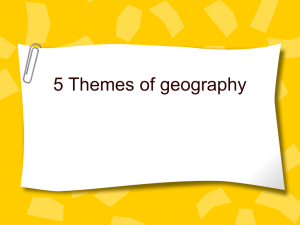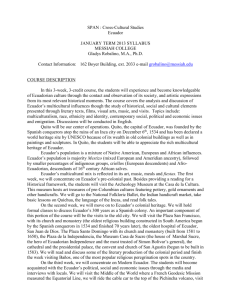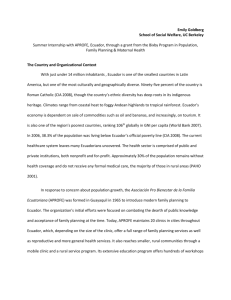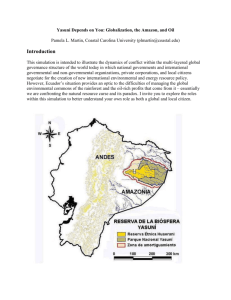Reflection Papers - UVM Continuing Education
advertisement
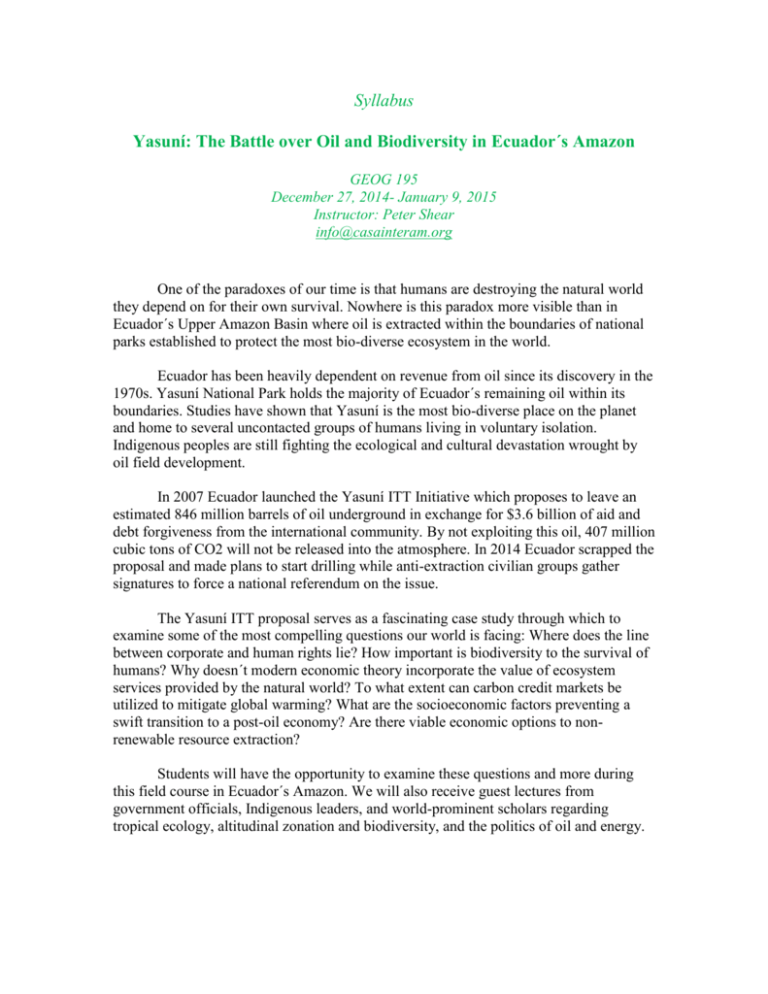
Syllabus Yasuní: The Battle over Oil and Biodiversity in Ecuador´s Amazon GEOG 195 December 27, 2014- January 9, 2015 Instructor: Peter Shear info@casainteram.org One of the paradoxes of our time is that humans are destroying the natural world they depend on for their own survival. Nowhere is this paradox more visible than in Ecuador´s Upper Amazon Basin where oil is extracted within the boundaries of national parks established to protect the most bio-diverse ecosystem in the world. Ecuador has been heavily dependent on revenue from oil since its discovery in the 1970s. Yasuní National Park holds the majority of Ecuador´s remaining oil within its boundaries. Studies have shown that Yasuní is the most bio-diverse place on the planet and home to several uncontacted groups of humans living in voluntary isolation. Indigenous peoples are still fighting the ecological and cultural devastation wrought by oil field development. In 2007 Ecuador launched the Yasuní ITT Initiative which proposes to leave an estimated 846 million barrels of oil underground in exchange for $3.6 billion of aid and debt forgiveness from the international community. By not exploiting this oil, 407 million cubic tons of CO2 will not be released into the atmosphere. In 2014 Ecuador scrapped the proposal and made plans to start drilling while anti-extraction civilian groups gather signatures to force a national referendum on the issue. The Yasuní ITT proposal serves as a fascinating case study through which to examine some of the most compelling questions our world is facing: Where does the line between corporate and human rights lie? How important is biodiversity to the survival of humans? Why doesn´t modern economic theory incorporate the value of ecosystem services provided by the natural world? To what extent can carbon credit markets be utilized to mitigate global warming? What are the socioeconomic factors preventing a swift transition to a post-oil economy? Are there viable economic options to nonrenewable resource extraction? Students will have the opportunity to examine these questions and more during this field course in Ecuador´s Amazon. We will also receive guest lectures from government officials, Indigenous leaders, and world-prominent scholars regarding tropical ecology, altitudinal zonation and biodiversity, and the politics of oil and energy. Itinerary December 27, 2014- Arrive in Quito airport, travel 10 minutes to Hosteria San Carlos. December 28- Day-long Seminar: primers in Tropical Ecology, the Geography of the Tropical Andes, and the History of Oil and Politics in Ecuador. December 29- Travel by airplane to Coca, and then by motorized canoe and car to the Tiputini Biodiversity Station; p.m.- night hike with a professional guide to see flora and fauna as well as to receive explanations about the rainforest and the people who live in surrounding areas. December 30- a.m.- We explore Tiputini´s canopy walkway system to get another perspective of the forest. Once again, this means a different kind of access to different species that can only be heard or barely seen from the forest; p.m; Lecture: Tropical Ecology and Biodiversity with Kelly Swing, world renowned ecologist. December 31- a.m.- visit a black water lagoon, an ecosystem quite unique to this part of Amazonia, home to species that are not likely to be seen in other parts of the forest. p.m; Group Learning Activity: Ecuador and Oil in the World Economy January 1, 2015- a.m.- Group Learning Activity: Yasuní ITT and its Geopolitical Actors. p.m.- We hike through the rain forest to Tiputini´s tree platform 160 feet above the forest floor to bird watch and enjoy the sunset January 2- a.m.- Group Learning Activity: Alternatives to an extraction-based economic development model: Carbon Markets and Ecosystems Services. p.m.- we enjoy our last afternoon in Tiputini floating down the river under the canopy of primary rain forest. January 3- Return to Coca and Hostel la Misión. January 4- Toxic Tour: meet with members of Defense of the Amazon to learn about the social and environmental impacts of oil extraction in Ecuador. Visit a refinery, oil derricks, and abandoned wells and waste treatment pools. Stay the evening in Lago Agrio. January 5- a.m.- Lecture: The history of Texaco in Ecuador and the class action lawsuit against the company, with Pablo Fajardo, Goldman Environmental Award Winner. p.m.Visit the Cofán indigenous community of Dureno, Meet with members of the Cofán indigenous nation to hear about their experience with the establishment of oil extraction on ancestral land; back to Lago Agrio. January 6- Return to Quito by airplane, travel one hour to Papallacta. January 7- Study and Reflection day in Papallacta, January 8- back to hotel near airport. January 9- fly home Academic Format and Requirements This study-abroad course includes lectures, discussions, small group activities, and experiential education in Ecuador´s Amazon region. Students participate in two pretrip meetings and a post-trip seminar to submit and share research projects and evaluate the course. Students are graded on the following: Participation 30% Pre-trip Analytical Writing Assignments 20% Reflection Papers (2) 10% Post-trip Research Paper 40% Participation Participation will be evaluated in the following way: Criterion Exceeds Standard6 points Contributes ideas and solutions Contributes ideas and solutions Does not contribute ideas and solutions Values ideas of others Encourages ideas and gives constructive feedback Listens to and respects the opinions of others Rejects ideas and gives negative feedback Interrupts and does not listen to others´ opinions Functions as a positive member of the group Encouraging and inclusive of all participants Difficult to work with and doesn´t seem to care about others Helps Helps with logistics of course and course activities Does not help out 30 points maximum 10 points minimum Listens Meets StandardsVariable points Below Standard2 points Points Earned Point Total Pre-trip Analytical Writing Assignments Students are expected to complete the assigned text and supplementary readings for this course before arriving in Ecuador and submit four 2-3 page essays based on assigned study questions and the course text: All four essays should attempt to answer the assigned study questions through logic, illustrative examples from the text, and personal analysis. Each paper will (1) use at least five cited references from the text, (2) refer to and outline the main ideas and arguments of the text, and (3) be followed by questions, commentary, analysis, protests, opinions, or any combination of these. STUDY QUESTIONS (1000 words each; site at least five sources from assigned readings for each essay). 1. How has the physical geography of Ecuador historically affected human and economic development patterns? 2. How has the discovery of oil changed the economic and social development of Ecuador? 3. What are the main tenants of the Yasuní ITT proposal? 4. Discuss the reasons for, and arguments against, oil extraction within protected national park boundaries. Reflection Papers Students will have two short writing assignments while in Ecuador, which are part of their journal writing. The assignments are focused reflection papers that integrate experiential learning, guest presentations, readings, and overall thoughts and questions. Students write daily in a journal and use descriptive observations, reflections, and questions as a basis for the two reflection papers. There is no set length, although 5 handwritten pages is the minimum. Reflection Paper 1 is a field journal that includes lecture notes, personal observations, drawings, and field notes. Reflection Paper 2 will due towards the end of the trip. This paper takes the form of a research proposal, and will describe the following: a) What do you want to do or discover? b) What primary information and data have you gathered, c) How will you gather the needed secondary materials and information? d) How will you present your materials and information? and e)Why do you think this project is worthwhile? By the end of the two weeks in Ecuador, you should have discussed your ideas for your Final Research Paper or project with Peter. The Final Research Paper should explore some aspect of the Battle Over Oil and Biodiversity in Ecuador´s Amazon, a very broad and malleable theme. Exactly what the final product will look like will be tailored to fit your academic goals and interests. While the research project can be designed to give you an opportunity to express your learning through non-traditional media, the final product must include a written research paper. The research paper should follow commonly accepted rules of academic scholarship and consist of at least 3500 words. The project will be due one month after the Spring Semester begins. Late work will not be accepted. Required Readings Book Yasuni Green Gold: The Amazon Fight to Keep Oil Underground, Mauro Burzio, Ginés Haro Pastor, Georgina Donati and Troth Wells, New Internationalist Press, 2008. Readings available on course webpage: Davidov, V.M. 2010. Shamans and Shams: The Discursive Effects of Ethnotourism in Ecuador. The Journal of Latin American and Caribbean Anthropology 15(2): 387-410. (attached- this one situates ecotourism for students in relation to broader tourist demands, etc.). Davidov, V.M. 2013. Mining versus Oil Extraction: Divergent and Differentiated Environmental Subjectivities in "Post-Neoliberal" Ecuador. The Journal of Latin American and Caribbean Anthropology 18(3): 485-504. Buscher, Bram, and Davidov, Veronica (Eds). 2013. The Ecotourism-Extraction Nexus: Political Economies and Rural Realities of (un)Comfortable Bedfellows. London: Routledge. Zalik, Anna. 2011. "Protest as Violence in Oilfields: The Contested Representation of Profiteering in Two Extractive Sites" in S. Feldman, C. Geisler and G. Menon (eds) Accumulating Insecurity. Athens, University of Georgia Press. p 261-284. Rain Forest for Sale: Demand for oil is squeezing the life out of one of the world’s wildest places, National Geographic: 2013, by Scott Wallace. Drilling for Oil in Eden: Initiative to Save Amazon Rainforest in Ecuador Is Uncertain, Scientific American, March 17, 2012, by R. Douglas Fields The following academic articles are available at www.academia.edu under the search headings Yasuní National Park, Ecuador and Yasuní-ITT: The Slippery Slope of Tourism and Oil in the Amazon: The Story of Tena, Ecuador by Phyllis Enchill A New EJOLT Report: towards a Post-oil Civilization. Yasunization and Other Initiatives to Leave Fossil Fuels in the Soil by Ricardo Coelho The riddle of leaving the oil in the soil—Ecuador's Yasuní-ITT project from a discourse perspective by Cristina Espinosa A New Conservation and Development Policy: Exploring the Tensions of the Yasuní ITT Initiative by Murat Arsel Learning Goals Topical area (skill area)* Geographical / scholarly approaches to contemporary problems (1,2) Breadth of the discipline (1) 100 Level Develop more sophisticated understanding of processes over space and time Draw on multiple fields of knowledge to analyze geographic phenomena Begin to formulate original and integrated analyses and critiques Understand scope and breadth of a subfield of the discipline Concepts Build upon existing content and vocabulary/build conceptual depth Argument (3, 4) Develop understanding of distinctions and connections between the theoretical and the empirical Formulate answerable research questions /How are research questions framed? Methods (3, 4, 5) Survey a variety of research methods and practice Practice methods employed in subdiscipline Learning and communication Develop more sophisticated communication skills in writing, oral presentation and class discussion The course draws on wide range of academic publications, investigative journalism and, most importantly, experiential education in the field. We use spatial analysis and maps to analyze, economic, cultural, biodiversity, politics, and environmental policy. This is a multidisciplinary course but we look in depth at biogeography and the political economy of non-renewable natural resource extraction. The geographic and ecosystem services studies utilized help students´ conceptual depth. All lectures are framed in geographic analysis. Field courses are the best way to help students contrast theoretical and empirical analysis based on how their own experience and observations contrast with impressions given by readings and lectures. We use maps as a lens through which to analyze biogeogphy, natural resource use and distribution, the political economy of oil, and ecosystems services, while explaining the basics of each of these academic disciplines through our field case study. Also students have the chance to listen to, and directly talk with, representatives of the different actors in our geopolitical case study. All students are required to keep a journal, develop a research proposal, complete a research project, and present it orally. We work on the development of a thesis and identify primary and secondary resources for the research project during the course.
